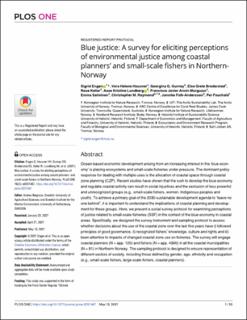| dc.contributor.author | Engen, Sigrid | |
| dc.contributor.author | Hausner, Vera Helene | |
| dc.contributor.author | Gurney, Georgina G. | |
| dc.contributor.author | Broderstad, Else Grete | |
| dc.contributor.author | Keller, Rose | |
| dc.contributor.author | Aasen Lundberg, Aase Kristine | |
| dc.contributor.author | Murguzur, Francisco Javier Ancin | |
| dc.contributor.author | Salminen, Emma Annika | |
| dc.contributor.author | Raymond, Christopher M. | |
| dc.contributor.author | Falk-Andersson, Jannike | |
| dc.contributor.author | Fauchald, Per | |
| dc.date.accessioned | 2024-01-30T15:28:40Z | |
| dc.date.available | 2024-01-30T15:28:40Z | |
| dc.date.created | 2021-06-10T12:30:41Z | |
| dc.date.issued | 2021 | |
| dc.identifier.issn | 1932-6203 | |
| dc.identifier.uri | https://hdl.handle.net/11250/3114660 | |
| dc.description.abstract | Ocean-based economic development arising from an increasing interest in the ‘blue economy’ is placing ecosystems and small-scale fisheries under pressure. The dominant policy response for dealing with multiple uses is the allocation of coastal space through coastal zone planning (CZP). Recent studies have shown that the rush to develop the blue economy and regulate coastal activity can result in social injustices and the exclusion of less powerful and unrecognized groups (e.g., small-scale fishers, women, Indigenous peoples and youth). To achieve a primary goal of the 2030 sustainable development agenda to “leave no one behind”, it is important to understand the implications of coastal planning and development for these groups. Here, we present a social survey protocol for examining perceptions of justice related to small-scale fisheries (SSF) in the context of the blue economy in coastal areas. Specifically, we designed the survey instrument and sampling protocol to assess whether decisions about the use of the coastal zone over the last five years have i) followed principles of good governance, ii) recognized fishers’ knowledge, culture and rights and iii) been attentive to impacts of changed coastal zone use on fisheries. The survey will engage coastal planners (N = app. 120) and fishers (N = app. 4300) in all the coastal municipalities (N = 81) in Northern-Norway. The sampling protocol is designed to ensure representation of different sectors of society, including those defined by gender, age, ethnicity and occupation (e.g., small-scale fishers, large-scale fishers, coastal planners). | |
| dc.language.iso | eng | |
| dc.subject | Miljørettferdighet | |
| dc.subject | Environmental justice | |
| dc.subject | Fiske | |
| dc.subject | Fish | |
| dc.title | Blue justice: A survey for eliciting perceptions of environmental justice among coastal planners’ and small-scale fishers in Northern-Norway | |
| dc.type | Peer reviewed | |
| dc.type | Journal article | |
| dc.description.version | publishedVersion | |
| dc.subject.nsi | VDP::Sosiologi: 220 | |
| dc.subject.nsi | VDP::Sociology: 220 | |
| dc.source.volume | 16 | |
| dc.source.journal | PLOS ONE | |
| dc.source.issue | 5 | |
| dc.identifier.doi | 10.1371/journal.pone.0251467 | |
| dc.identifier.cristin | 1915054 | |
| dc.relation.project | Framsenteret: Climate Change in Fjord and Coast (Grant No. 152019) | |
| dc.relation.project | Norges forskningsråd: 280778 | |
| cristin.ispublished | true | |
| cristin.fulltext | original | |
| cristin.qualitycode | 1 | |
